Science News: Recent scientific discoveries and expert analysis
Read the latest science news and recent scientific discoveries on Live Science, where we've been reporting on groundbreaking advances for over 20 years. Our expert editors, writers and contributors are ready to guide you through today's most important breakthroughs in science with expert analysis, in-depth explainers and interesting articles, covering everything from space, technology, health, animals, planet Earth, and much more.

Explainers | Everything you need to know about the science news that matters.

Science Spotlight | Shining a light on new science transforming our world.
Latest news
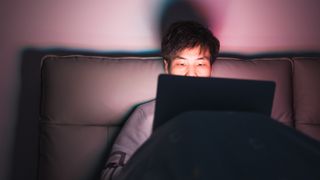
'Night owls' may have worse heart health — but why?
By Isha Ishtiaq published
Emerging evidence suggests that "night owls" are more likely to have poor heart health and a higher risk of heart attack or stroke than "morning larks." Why is that?
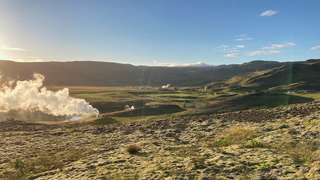
Microbes in Iceland are hoarding nitrogen, and that's mucking up the nutrient cycle
By Javier Barbuzano, Eos.org published
A study in Iceland found that microbes are hoarding more nitrogen for themselves, altering nutrient cycling and leaving less for plants.

Physicists push quantum boundaries by turning a superfluid into a supersolid — and back — for the first time
By Damien Pine published
Physicists saw excitons, a type of quasiparticle, undergo a reversible phase transition from superfluid to supersolid for the first time, opening new doors for studying extreme states of matter.

Dramatic death of Comet C/2025 K1 (ATLAS) caught on camera — Space photo of the week
By Jamie Carter published
The Gemini North telescope snapped a spectacular view of Comet C/2025 K1 (ATLAS) breaking apart as it emerged from the other side of the sun in October.

AI-supported breast cancer screening spots more cancers earlier, landmark trial finds
By Jennifer Zieba published
A clinical trial shows that AI-assisted mammography can detect more cases of dangerous cancer and reduce missed diagnoses.

'There's no reason to ban us from playing': Analysis debunks notion that transgender women have inherent physical advantages in sports
By Kristina Killgrove, Nicoletta Lanese published
A meta-analysis of 52 studies that included over 5,000 transgender people suggests that transgender women's physical fitness after hormone therapy is comparable to that of cisgender women.

Clean energy is surging — with or without Trump
By Yale Climate Connections, Barbara Grady published
In 2025, solar and wind surpassed coal as a global energy source.
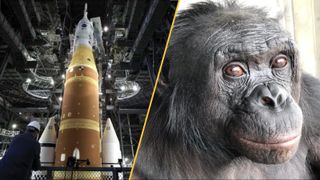
Discoveries inside Earth, Artemis II scrub, and an ape that can play pretend
By Ben Turner published
Science news this week Feb. 7, 2026: Our weekly roundup of the latest science in the news, as well as a few fascinating articles to keep you entertained over the weekend.
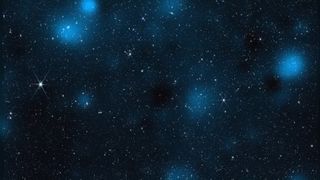
'Invisible scaffolding of the universe' revealed in ambitious new James Webb telescope images
By Joanna Thompson published
A team of researchers using the James Webb Space Telescope has produced the most detailed map of dark matter to date.
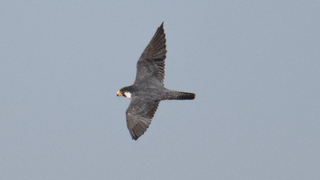
Extraordinary photo captures first appearance of Siberian peregrine falcon in Australia's arid center
By Aristos Georgiou published
An ecologist has captured a photo of a peregrine falcon subspecies in an unprecedented location.

Scientist accidentally stumbles across bizarre ancient ‘wrinkle structures’ in Morocco that shouldn't be there
By Stephanie Pappas published
Ancient fossil structures imprinted on rocks that were once deep beneath the ocean suggest the search for the first life on Earth needs to be broadened.
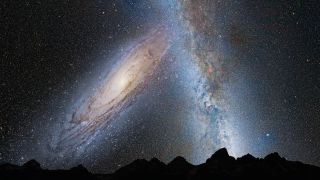
Every major galaxy is speeding away from us, except one — and we finally know why
By Ivan Farkas published
A vast, flat sheet of dark matter may solve the long-standing mystery of why our neighboring galaxy Andromeda is speeding toward us while our other neighbors are moving away from us.
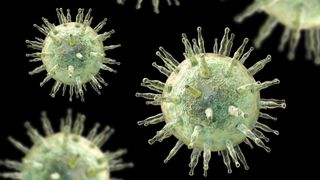
The 'mono' virus raises the risk of MS and cancer in some. 22 genes hint at why.
By Stephanie Pappas published
An infection with Epstein-Barr virus is a nonevent for most people. But for a subset, the virus can contribute to chronic conditions and cancer, and genes may play a role in that risk.
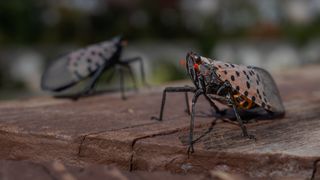
Spotted lanternflies are invading the US. They may have gotten their evolutionary superpowers in China's cities.
By Chris Simms published
The alarming spread of spotted lanternflies across the U.S. has been made possible by cities acting as evolutionary incubators, fine-tuning the insects and enabling them to thrive.

Kanzi the bonobo could play pretend — a trait thought unique to humans
By Sophie Berdugo published
Past anecdotal observations have hinted that great apes play pretend. But now, experimental research shows that our closest living relatives can keep track of imaginary objects.
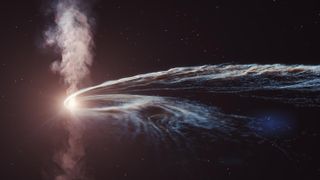
Star-killing black hole is one of the most energetic objects in the universe
By Elizabeth Howell published
Scientists say a jet from a previously studied supermassive black hole has grown brighter, becoming one of the most energetic events in the universe.

Martian meteorite that fell to Earth is full of ancient water, new scans reveal
By Harry Baker published
A new study has revealed that the iconic Black Beauty meteorite contains much more hidden water than previously suspected. The rock, which fell to Earth from Mars, could reveal clues about the Red Planet's watery past.
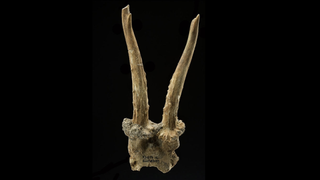
7,500-year-old deer skull headdress discovered in Germany indicates hunter-gatherers shared sacred items and ideas with region's first farmers
By Tom Metcalfe published
The discovery of a deer skull headdress and tools made from antlers at the site of a New Stone Age farming village suggests that hunter-gatherers were sharing ideas with the newcomers.

How well can AI and humans work together? Scientists are turning to Dungeons & Dragons to find out
By Alan Bradley published
D&D is being used as a benchmark to see how well models can make long-term plans, adhere to rules and strategize with a team.
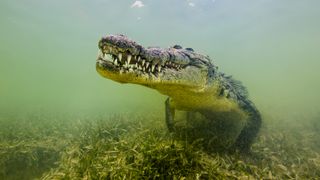
Saltwater crocodiles crossed the Indian Ocean to reach the Seychelles — before humans arrived and wiped them out
By Skyler Ware published
A DNA study reveals crocs that lived in the Seychelles represented the westernmost population of saltwater crocodiles, having swam at least 1,800 miles to reach the island.
Get the world’s most fascinating discoveries delivered straight to your inbox.
 Live Science Plus
Live Science Plus











